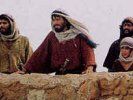Eye For Film >> Movies >> Masada (1981) Film Review
I remembered watching this four-part TV mini-series when it was first shown in 1981, and I came to watch the DVD expecting to find it dated and not as good as I remembered. I was wrong. Taken as a whole, this still makes a fine and entertaining six hours of viewing.
In 70 AD, Judea is under occupation by the Roman 10th legion. After the destruction of the Second Temple in Jerusalem, the Hebrews are forced to flee, some becoming bandits and resistance fighters, burning granaries and poisoning wells in an attempt to make life impossible for the occupying forces. Eventually 900 men, women and children take refuge at Masada, an extraordinary natural rock fortress in the desert.

General Flavius Silva (Peter O’Toole), commander of the legion, wants to reach a peaceful compromise with the Jews. He meets with their leader, Eleazer ben Yair (Peter Strauss), who wants to create a Judea which can be an ally of Rome instead of its slave. Silva goes to Rome and puts his proposals to the Emperor Vespasian (a young Timothy West), but personalities and politics in Rome cause Vespasian to send Silva back as Governor to crush the rebellion.
A siege commences, which develops into a battle of wits and strategy between the two leaders. The Roman legion has 5000 men and a complete armoury of weapons, but the Jews have the superb natural defences of Masada and a vast supply of food and water, while the Romans struggle in the desert sun.
Peter O’Toole gives a towering performance, which alone makes this film worth watching. At this time he was already one of the most popular actors of his generation, having played roles such as Lawrence of Arabia. He is charismatic and utterly commanding, yet also conveys kindness, vulnerability and world weariness, particularly in scenes with Barbara Carrera as the Hebrew woman he takes as his mistress.
Anthony Quayle makes a very credible and sympathetic second-in-command, as the engineer and strategist Rubrius Gallus, and David Warner is convincing as the treacherous Falco, who proposes more ruthless methods of breaking the siege.
The detail and historical accuracy is impressive, in the uniforms, the war machines, the setting out of the camp, giving a fascinating insight into Roman warfare. There is a huge cast of extras (no CGI crowds here), and the film was shot mainly on location at Masada itself. Apparently the crew worked in shifts, avoiding the hottest part of the day, though the Romans don’t seem to have adopted this plan and are seen labouring in the midday heat, only deciding towards the end to work at night, and then only to speed things up.
The struggle, however, is unequal. The Romans have the best lines, the best characters and the best actors. Peter Strauss was also at the height of his popularity when he took this role, thanks largely to Rich Man, Poor Man, another TV mini-series which was a huge hit at the end of the Seventies. But he simply doesn’t have the gravitas to match Peter O’Toole. The Romans have interesting arguments, the Jews have scenes of cosy domesticity. True, Eleazer has his own personal battle with his faith and there are divisions between the fighters and the ultra religious, but there is never really any doubt about the outcome of their quarrels. The Jewish characters are two dimensional, and where are the children and the pregnant women? I could have cared more about their eventual fate.
The plight of the Romans is all too easily recognisable (probably more so today than in 1981). They are fighting a prolonged war in a land far from home, in inhospitable conditions, with unclear aims, against an indigenous population who know the terrain and can seemingly hold out indefinitely. Everyone is asking: “When will the 10th legion be pulled out of Judea?” Asked why he can’t go for a quicker solution, Silva says “Part of my job here is to win the peace. We must teach the population of this country that they can trust us.” That old problem.
One possibly jarring note in the light of recent events – The film begins and ends with scenes of present day Masada, where Israeli soldiers go to be sworn in. Jerry Goldsmith’s rousing score is accompanied by a strident voiceover telling us that “The Israeli soldier is the most daring and defiant defender of freedom in the world.”
Reviewed on: 25 Jan 2009















